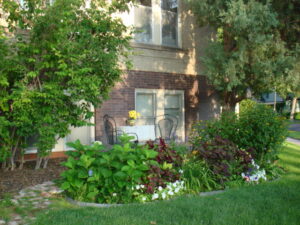 Arriving home after a long absence, I found a book inside my front door. I read the sweet note attached and thought it was an anonymous gift. I then saw the second page of the note, along with the signature. Her words to me were personal and so touching. Thank you!
Arriving home after a long absence, I found a book inside my front door. I read the sweet note attached and thought it was an anonymous gift. I then saw the second page of the note, along with the signature. Her words to me were personal and so touching. Thank you!
The book was titled “Tending the Wild Garden” by Eugenia Anne Gamble. It is centered around the teachings of Paul and intended for slow reading to allow for reflection, so I am only through the introduction as I write this article.
As I read the thoughts behind the book’s purpose, a little memory popped in for a visit: an Old Library Inn guest from Wheat Ridge who was writing a book about approaching the good and bad of life as you would care for a garden.
Both authors used gardens as metaphors for a well-lived life.
Think of the aspects of a garden. There is much preparation before tilling the ground or planting seeds. As with mental health, a garden is complex yet simple. As in life, it needs nourishment, water, sunshine, and attention. Weeds appear without invitation, and if we don’t get rid of them, they overpower the goodness awaiting our eyes and appetites. Often, we have rocks to deal with.
The same is true for mental health. It takes effort and intention to rid our thoughts of suffocating weeds, and to access our creativity to see over the boulders that are too heave to move—or to use them as stepping stones or accents for texture and interest.
We all have weeds and rocks in our lives, but if we manage our perspectives, we can grow flowers, raise fruits and vegetables, and store away goodies to get us through tough times—past, present, and future. We all had, have, and will have them—tough times, that is.
Both women and the books they shared reminded me that we are in this challenge called life together. We are all trying to figure it out, make the best of it, help others, sidestep the avalanches, and enjoy the harvest, all while giving thanks and planning for the future.
Life brings us both our hardest lessons and our softest joys. We can admit fault or give ourselves due credit in many situations, but much of both plop at our feet or fall on our heads. As with tending a garden, we can say there is nothing to save after the hailstorm, but, guess what, that is seldom true. I’ve seen miraculous recovery of good after evil in children, teens, adults, and seniors. It’s all a matter of weeding, seeing possibilities, nurturing, and never giving up.
Until the next time: Live while you live.
Jennifer Goble, Ph.D., LPC, is the author of “My Clients…My Teachers,” and the blogger and writer of Rural Women Stories: www.ruralwomenstories.com.
Powered by WPeMatico